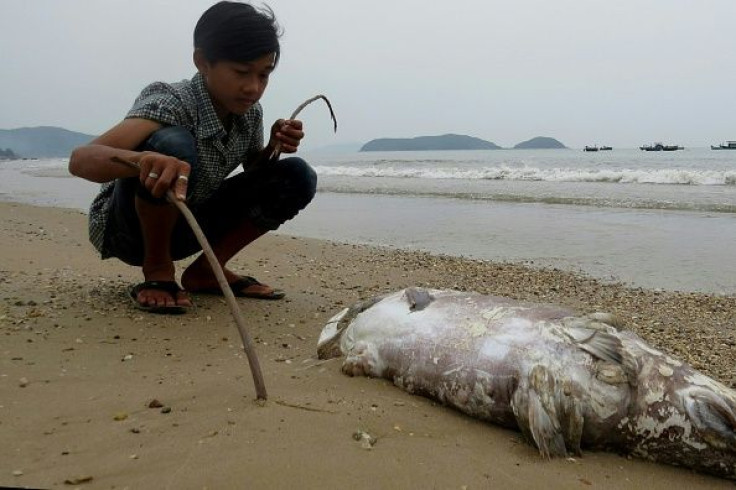Vietnam Dead Fish Crisis: Critics Blast Formosa Plastics As Environmental Disaster Devastates Region

Outraged citizens in Vietnam and across social media are still seeking answers and demanding action as large numbers of fish turn up dead along extensive stretches of the country’s central coastline, putting fishermen out of work and leading to a ban on seafood sales in the region.
The cause of the environmental disaster is still unknown, but many in the country have been pointing to a steel plant owned by a subsidiary of the Taiwanese conglomerate Formosa Plastics Corporation. The facility is located in the Vung Ang Industrial Zone and connected to a mile-long water pipeline, which is thought to be the source of industrial contaminants.
Earlier last week, the Vietnamese government said there was no evidence that the plant was responsible for the fish deaths, as Reuters reported, instead pointing to a toxic overproduction of algae, a phenomenon known as “red tide.” But that explanation did not satisfy critics who said the government has been slow to respond to the crisis and lacks any semblance of transparency or accountability.
Activists in the Tran Hong Ha province protested Formosa Plastics last week by piling up dead fish along the national highway, according to social media postings cited by Radio Free Asia.
On Friday, Vietnam’s minister of environment and natural resources, Tran Hong Ha, apologized for the government’s “confused” response to the crisis and told reporters that he’d had discussions with Formosa management, RFA reported. He went on to say it now appears as if the waste pipeline is not being installed properly and he requested monitoring of the situation.
Representatives of Formosa Plastics did not immediately respond to a request for comment.
The situation is reportedly having a devastating effect on local fishing communities, with the country’s director of fisheries estimating losses of $200,000 in just one week, according to the Asia-Pacific news website the Diplomat. The deaths are said to include not just shallow-water fish but also rare species. As of last week, more than 40 tons of dead fish have turned up along Vietnam’s central provinces, the news agency VnExpress reported.
On Thursday, the Vietnamese government banned the sale and distribution of seafood from affected areas.
Meanwhile, calls for action and accountability are spreading feverishly across social media, including in the United States, where more than 17,000 people have signed a White House petition asking the U.S. government to investigate the cause of the fish deaths. Another petition, on Change.org, is asking the famed environmental crusader Erin Brockovich to lead activists in a class action lawsuit against Formosa.
Elsewhere on social media, some commentators said they hoped the global outcry could spur needed changes in a country known for a lack of transparency. “This is an unmitigated environmental catastrophe,” one Facebook user, identified as a student at the University of Economics, Ho Chi Minh City, posted. “I wouldn't be surprised if it brings about some kind of change in VN government accountability, if not revolution.”
Christopher Zara covers media and culture. News tips? Email me. Follow me on Twitter @christopherzara
© Copyright IBTimes 2024. All rights reserved.












